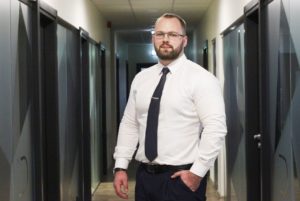
Vladislav Kežun
Vladislav Kežun is a distance-learning bachelor’s student in Aviation Management study program and living in sunny Bangkok, where he is working in the sales department for FL Technics: MRO Aircraft Maintenance and Repair Services company for the past few years. Vladislav talks about his career in aviation and the peculiarities of this sector.
How did you decide to start your career in the aviation sector? What makes this job interesting and how did you find yourself in Bangkok?
Before working in the aviation sector, I worked in sales for a while with industrialists. However, very quickly I realized that the industrial sector in Lithuania is not very large and there are few prospects. I looked at different sectors and by chance saw an advertisement that an airline was looking for employees. My job interview took place at the Lithuanian airport, and I still remember some conversation word for word “If you have already got into aviation, it is unlikely that you will get out of it.” The words seemed fateful for me.
I have been working for the FL Technics for 4 years. Our market is very large: the Middle East, Africa, Europe, and Asia, so I have been living and working in one of the company’s divisions based in Bangkok.
What does your workday look like?
If the day starts in the office in the morning, I first spend a few hours reading and replying to emails, finishing up my meetings, and getting ready for new ones.
There is no monotony in my work, I have to spend a lot of time flying for meetings with clients. My responsibility is to develop the Asian market, and of course, to make as many successful sales transactions as possible.
Do you sell aircraft parts? what amounts we are talking about and who are your buyers? In what circumstances may a buyer need, for example, an aircraft engine?
The sums are really impressive – we are talking about millions of transactions. The main customers are airlines from different countries. Aircraft engines are one of the most expensive parts of an aircraft. In terms of demand, it occurs when an old engine wears out. Airplanes are designed to last for a long time (e.g., American airplanes have a lifespan of about 30 years), but engine life is fairly perpetual, much like a car’s engine condition is determined by mileage. Therefore, the engines need to be replaced or repaired after some time.
The work is fun, doing well, so what inspired you and why did you decide to start studying Aviation Management?
I studied business management at another high school, but the studies did not live up to my expectations. I studied many different disciplines, but nothing specific. When working with classic sales, such knowledge may be sufficient, but in my case, the chosen field of aviation is very specific and such general knowledge is not enough.
The FL Technics pays a lot of attention to their staff development: I had more than 10 different types of trainings during my first year at work. Those trainings made me realize, how big the industry is and how much space is available for the growth and expansion. This probably had the biggest impact on my decision to study Aviation Management and earn a bachelor’s degree in this niche field.
How do you rate such a choice today? How do you manage to combine work with studies?
Reconciling work with studies is great, Thailand is 4 hours ahead of Lithuania, after work I can listen to all the lectures. In my studies, I highly appreciate the skills and dedication of the teachers. They are not only strong in theoretical knowledge but also practitioners, who are experts in aviation and understand the size, importance, and scale of the market. This form of study is very convenient for a working person, for example, if I have an important meeting with a client in China and I can’t miss it, so I can deliver my homework a few days later, or if I can’t attend lectures remotely “live”, I have the possibility to view the uploaded lecture later. Such understanding, convenience, and individual attention are immensely valuable.
Who would you recommend distance Aviation Management studies?
This is a very specific area, so I recommend distance learning Aviation Management studies for those who already working in the sector and have the basic knowledge to understand the subjects or the terminology. It is also better for students if they are from the same industry. Hence, they can speak the same aviation language, grow their network and share their diverse work experiences of domestic or international airlines.